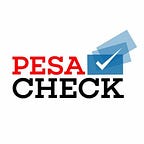HOAX: This offer of free laptops from USAID Kenya is not legitimate
The website with the promotion is not registered as belonging to USAID, and applicants are asked to pay a fee
A website using the name of the United States Agency for International Development (USAID) — Kenya and claiming to offer free laptops to Kenyans is FAKE.
The claim, published on communityempowermentke.com, says that USAID Kenya has partnered with the Ministry of Information, Communication, and Technology to donate at least 2,000 laptops in each of Kenya’s 47 counties, as assistance for those in distress as a result of the COVID-19 pandemic.
The post states that application is open to Kenyans aged over 18, but says students below that age can apply through their guardians or parents. Applicants can book up to two laptops. To register, those interested are asked to fill out an online form and pay a Ksh 300 booking fee through an M-Pesa till number.
However, USAID’s Head of Mission in Kenya, Mark Andrew Meassick, stated that the humanitarian organization is not conducting any such promotion in Kenya.
Speaking to PesaCheck on the phone, Mr Meassick added that USAID does not engage in promotions of this kind, but does humanitarian work in collaboration with non-governmental organizations and state institutions. He noted that the organization only posts its activities on USAID’s official website and social media pages.
Further, a WhoIs search shows the registration of the communityempowermentke.com domain was done on February 19, 2020, in Nairobi, Kenya. Conversely, WhoIs information on the USAID website shows that it was registered in July 1996.
This claim appears to have borrowed heavily from another one, published on a fake page impersonating the Ministry of ICT, that PesaCheck debunked.
PesaCheck has looked into a website claiming to belong to the USAID and offering free laptops to Kenyans in distress as a result of the COVID-19 pandemic, and finds it a HOAX.
This post is part of an ongoing series of PesaCheck fact-checks examining content marked as potential misinformation on Facebook and other social media platforms.
By partnering with Facebook and similar social media platforms, third-party fact-checking organisations like PesaCheck are helping to sort fact from fiction. We do this by giving the public deeper insight and context to posts they see in their social media feeds.
Have you spotted what you think is fake news or false information on Facebook? Here’s how you can report. And, here’s more information on PesaCheck’s methodology for fact-checking questionable content.
This fact-check was written by PesaCheck Fact-Checker James Okong’o and edited by PesaCheck Deputy Editor Enock Nyariki.
The article was approved for publication by PesaCheck Managing Editor Eric Mugendi.
PesaCheck is East Africa’s first public finance fact-checking initiative. It was co-founded by Catherine Gicheru and Justin Arenstein, and is being incubated by the continent’s largest civic technology and data journalism accelerator: Code for Africa. It seeks to help the public separate fact from fiction in public pronouncements about the numbers that shape our world, with a special emphasis on pronouncements about public finances that shape government’s delivery of Sustainable Development Goals (SDG) public services, such as healthcare, rural development and access to water/sanitation. PesaCheck also tests the accuracy of media reportage. To find out more about the project, visit pesacheck.org.
PesaCheck is an initiative of Code for Africa, through its innovateAFRICA fund, with support from Deutsche Welle Akademie, in partnership with a coalition of local African media and other civic watchdog organisations.
